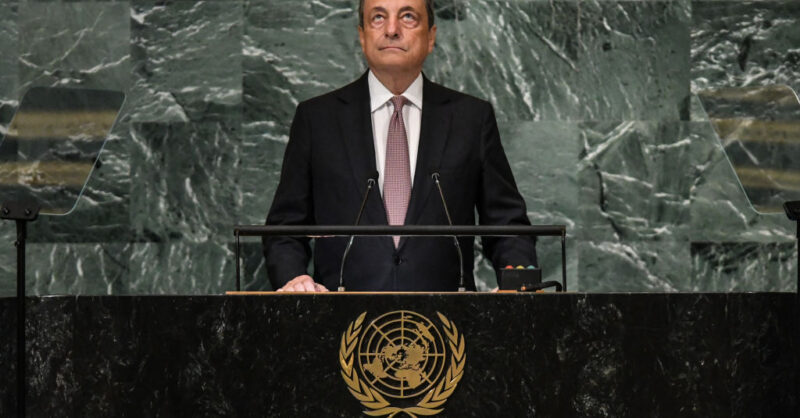
When the facts change, Mario Draghi changes his mind. He seems certain to have changed his mind about many of the policies the bank supported during the eurozone crisis after he led the European Central Bank from 2011 to 2019.
At the time, the instructions coming from Frankfurt were that if member states wanted to coexist with Germany in the eurozone, they had to implement structural reforms and get their debts under control. In order to be more competitive, salaries have become relatively lower and social benefits have become less generous.
Speaking at a conference in Brussels on April 16, Draghi appeared to have abandoned all disciplinary approaches. The world changed and we were surprised, he explained. The speech was the first mention of his long-awaited report on the future of Europe's competitiveness, due in June and expected to mark a new beginning for Europe's declining economy. Rumors abound in Brussels that Draghi intends to use the momentum generated by the report to propel him into the European Building and into the European Council Presidency.
The changes and surprises hinted at by President Draghi in his speech can be summarized under one heading: “Return of the Nation.” When the term structural reform was ubiquitous, the goal of structural reform was not to make the states of Portugal, Italy, or Greece competitive with the states of Germany. Competition was supposed to take place between businesses and workers within a single market defined by rules free of political interference. In fact, the reform was to limit the role of the state in regulating both economic actors and public spending. True, the reality wasn't always perfect, but the ideal was strong. That is no longer the case, at least for Draghi. The condition is back.
In retrospect, there was something of an anarchist about old Draghi, but that only brought him closer to the original ideas behind the European project, and perhaps even the spirit of European history as a whole. After all, by using Brussels to limit the power of member states without creating a real alternative: a federal state, Europeans seemingly realized the wildest dreams of 19th century anarchists. It seems like I did. Nations declined, and in their place states disappeared. A system of automatic rules with almost complete freedom of discretion and sovereignty. To paraphrase the old saying: “How sweet it is to live without a nation.”
Anarchists' dreams usually end up being shattered by the realities of world politics. Life might be better without the intervention of state power, but the problem is that states survive elsewhere on the planet. How do you deal with those states if you don't have one of your own? Europeans today wrestle with this problem in two different areas: economic competition and military defense.
In his speech, Draghi noted that other regions and other major political blocs are marshaling strong national power to channel investment into their economies and control supply chains. It is interesting that he chose to mention both China and the US in this context. He even accused the United States of using protectionism to secure supply chains and “shut out competitors.” Perhaps this transatlantic unrest will rally French President Emmanuel Macron to Mr. Draghi's support, allowing Mr. Draghi to consolidate his leadership of the European Council and attempt to implement the report from his perch. will be able to do so.
But Draghi is making a common mistake. He seems convinced that Europeans have simply lost their desire to compete and need to get it back. But laziness is not the problem. Consider the case of Ukraine, the second source of European vulnerability. It is not that Europe is psychologically incapable of thinking about military matters or that it is too weak to create an army capable of countering the Russian threat. The problem is even more serious. Europeans fear and dislike the possibility of building strong states and powerful armies because they idealize societies in which order is no longer hierarchical but spontaneous. The old anarchic dream is still alive and is what distinguishes Europeans from Americans and Chinese. President Draghi would do well to remember these important questions of identity and civilization.
Does this mean that there is no solution to the fundamental problem of global competition between great powers? Not at all. It only means that the European Union must use the instruments of strong states to limit the scope of state power, and to do so on a global scale. Anarchism is a utopia and liberalism is a compromise to make anarchy work.
To achieve this, Europe should insist on a clear separation of politics and economics. Rather than emulating strong Chinese or American states, we need to weaken them, at least in the way we organize economic relations with these blocs. Instead of adopting the same subsidy formula, the EU should treat foreign subsidies in the same way as state aid within its borders. If companies profit from subsidies, they should be blocked from investing or fined for subsidized production. Make it clear that if other countries want access to the single market, economic exchanges need to be organized on the European model. And in defense, build the military necessary to defeat imperial projects on our borders, but not join in the call for “great power politics” and hegemonic competition that has already proven to be a complete failure.
The direction of the nation is not a logical necessity. The mistake in the past was not to believe in this separation, but to think that it occurs naturally and automatically. We now know that to achieve that we need to use the following tools: Geopolitical power, as Draghi says, includes an aggressive economic state strategy and new military capabilities that target all economies.
[See also: Europe’s hard right is deeply divided. Does it matter?]

